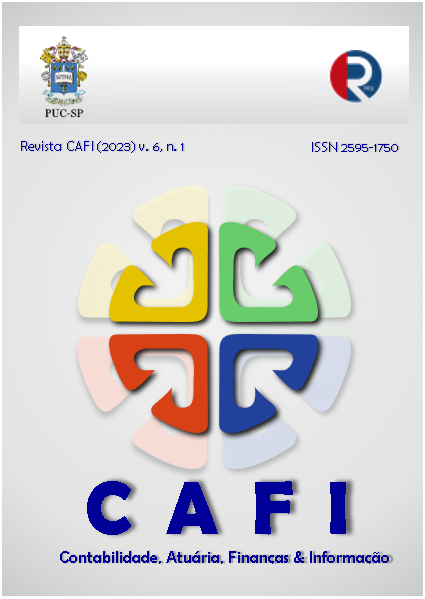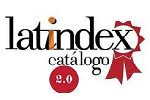Custeio baseado em atividades-ABC em uma indústria química:
um caso aplicado
DOI:
https://doi.org/10.23925/cafi.v6i1.58832Palavras-chave:
custo industrial, custo ABC, modelo de custos, custo na indústria químicaResumo
Este trabalho tem como objetivo apresentar um modelo de Custo para uma indústria química que produz materiais para sinalização viária. Compara os resultados dos custos de três meses obtidos pelo modelo proposto com o modelo utilizado atualmente pela empresa. A estrutura de custos da área de produção apresenta o custo da energia elétrica como o mais relevante. Por sua relevância, forma de identificaão ao produto e função no sistema de produção ele recebe tratamento contábil de custo direto, distinto do indicado pela literatura. São feitas medições precisas do consumo de energia reais dos produtos em cada equipamento por padrões de procedimento nas diversas fases do processo de produção. Na sequência, os custos de matéria-prima e outros materiais diretos são identificados aos produtos. Os custos indiretos serão alocados aos produtos com base nos conceitos do modelo ABC em sete etapas, desde o mapeamento das atividades até o custeamento dos produtos. Os resultados do estudo mostram os valores de custos pelo modelo proposto comparado aos do modelo atual. As diferenças de valores de custos por unidade chegam a seis vezes em um mesmo mês. Esta compração é evidência de que o custeio ABC tem maior sensibilidade para reproduzir a estrutura de produção utilizada nos processos nos valores de custos alocados. O Custeio ABC gera maior representatividade do processo e aceitação pelos gestores da estrutura de produção na empresa estudada.
Referências
Amal, M., Blumenschein, M., & de Vasconcelos, S. L. (2021). Reflexões sobre empresas multinacionais e a pandemia de covid-19. Revista Eletrônica de Negócios internacionais, 1 - 11.
Struckas Filho, C. S.; Borinelli, M. L. & Rocha, W. (2023). Uso de informações de custos em empresas brasileiras de hotelaria: uma visão sob a perspectiva dos tomadores de decisão. International Journal of Scientific Management and Tourism. Curitiba, Vol. 9 No. 1, pag. 441-66. https://doi.org/10.55905/ijsmtv9n1-021.
Moreira, L. V. M. & Frezatti, F. (2019). O papel do sistema de controle gerencial na transição entre estágios do ciclo de vida organzacional em uma empresa familiar. Revista Universo Contábil, 15(1), 65-84. Doi: 10.4270/ruc.2019104.
Frezatti, F. (2022). Coud the existence of managemente accouting mechanisms hinder instead of improve management? Revista Universo Contábil, 17(3), 175-195. doi:10.4270/ruc.2021319.
Halliday, D., Walker, J., & Resnick, R. (2023). Fundamentos da física (Vol. 3 eletromagnetismo). Rio de Janeiro: Editora LTC.
Iudícibus, S. (2021). Teoria da contabilidade. 12°.ed. Ed.Atlas: São Paulo.
Johnson, H. T., & Kaplan, R. S. (1999). Relevance Lonst: the rise and fall of management accounting. Massachusetts: Harvard Business School Press, 1999
Martins, E. (2018). Contabilidade de custos. Ed. Atlas: São Paulo.
Oliveira, Ádria T. A., Borba Neto, G. N., & Aleixo, D. de O. (2019). Metódos de custeio: os perfis dos artigos publicados nos congressos CUSTO, ANPCONT e USP. REVISTA ENIAC PESQUISA, 8(2), 298–318. https://doi.org/10.22567/rep.v8i2.552
Soares de Souza, D., Cruz, J. E., Carvalho, J. P., & de Souza Silva, A. Y. (2023). Dificuldades na implementação do Custeio ABC nas empresas. Revista Científica Acertte. https://doi.org/10.47820/acertte.v3i4.129
Brandão, C. R. (2018). Repensando a pesquisa participante. São Paulo: Ed. Brasiliense, 3°. Ed.
Wecker, A. C., Froehlich, C., & Gonçalves, M. A. (2020). Capacidades dinâmicas e estratégias para enfrentamento da crise diante da pandemia da covid-19. RGO – Revista Gestão Organizacional, 10-32.
Rengel, R., & Schnorrenberger, D. (2021). Influência do alinhamento de preferências dos operadores no uso das informações gerenciais. Revista Contabilidade & Finanças, 33(88), 81-95. https://doi.org/10.1590/1808-057x202112900
Downloads
Publicado
Como Citar
Edição
Seção
Licença
Copyright (c) 2023 CAFI

Este trabalho está licenciado sob uma licença Creative Commons Attribution 4.0 International License.
Declaração de Direito Autoral
Autores mantém os direitos autorais e concedem à revista o direito de primeira publicação, com o trabalho simultaneamente licenciado sob a Licença Creative Commons Attribution que permite o compartilhamento do trabalho com reconhecimento da autoria e publicação inicial nesta revista.
Declaração de Privacidade
Os nomes e endereços informados nesta revista serão usados exclusivamente para os serviços prestados por esta publicação, não sendo disponibilizados para outras finalidades ou a terceiros.









